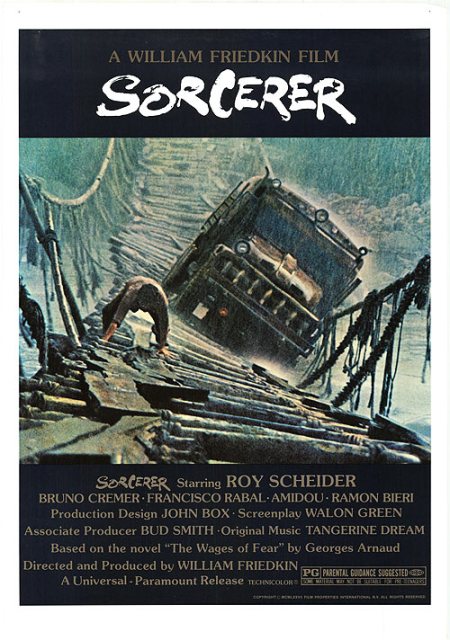Back in 2002, William Friedkin came to Melbourne to present a screening of his 1977 film Sorcerer at the Astor Theatre, and a fresh-faced (ha!) Guy Davis got to interview him. Here’s what went down.
In a South American shanty town where the air is thick with poverty, corruption and desperation, four men – all hiding from their pasts – are about to make a deal with the devil.
An oilfield run by an American company has erupted into flame, and the only way to extinguish the blaze is through a controlled explosion set off with the use of highly volatile nitro-glycerine.
Transporting the explosive over 200 miles of treacherous jungle terrain is virtually a suicide mission. For the four men who volunteer to drive the trucks full of nitro, however, the opportunity to buy back their freedom and return to their former lives is worth the risk.
That’s the story of Sorcerer, Oscar-winning director William Friedkin’s 1977 remake of the French classic The Wages of Fear.
The film was a labour of love for Friedkin, best known for intense, visceral pictures like The French Connection and The Exorcist, and it is a great showcase for his technical skills and bravura visual sense.
While Sorcerer features a number of sequences that are among the most gripping seen on screen in the last 30 years, the downbeat, character-driven and often oblique movie failed to connect with audiences when it was released in the late ‘70s.
It faced extra difficulties in Australia, where the local distributor decided to crop the first half-hour (which explains how the four main characters have ended up in such dire circumstances) to enable more screenings per day.
The Astor Theatre is currently screening a completely uncut print of Sorcerer, and this is the first time the film has been shown in its entirety in this country. Friedkin himself supplied the print, and then travelled to Melbourne to introduce it to audiences.
Readers of Easy Riders, Raging Bulls, Peter Biskind’s history of American cinema in the ‘70s, may get the feeling Friedkin is a hot-tempered, ego-driven prima donna. After speaking with him, I came away with the impression that this is a guy with a terrifically salty, no-nonsense outlook and a genuine passion for his art.
Friedkin loves to talk – most of his interviews went much longer than the allotted 20 minutes – and he is candid, opinionated and articulate. And Sorcerer remains his favourite out of the many films he’s directed over a career spanning five decades, even if it was extremely “hazardous and difficult” to make.
“We had to do everything mechanically. There were no digital opticals or effects in those days, 25 years ago,” he said.
“If I knew it would be such a hassle – that it would endanger people’s lives and my own life – and then meet the sort of fate that it met in some parts of the world, no, I wouldn’t have done it. But it is the favourite of all my films.”
Friedkin holds himself accountable for Sorcerer’s failure to connect with audiences, never believing that moviegoers simply “didn’t get” what he was trying to say.
“The only feeling is that I’ve failed in some way to communicate my intentions or to understand what the audience’s perceptions may be,” he said.
The only regret he has regarding Sorcerer is that he was unable to secure Steve McQueen as its star. While Friedkin is full of praise for Roy Scheider’s work in the lead, “McQueen was a genuine movie star who might have made the film more user-friendly.”
McQueen apparently called Sorcerer’s screenplay the best he’d ever read and wanted to be part of the project. However, he was reluctant to make the film in South America as he had just started a relationship with actress Ali MacGraw and didn’t want to be separated from her for the duration of the shoot. In a move he now calls “arrogant and stupid”, Friedkin turned down McQueen’s request for MacGraw to be made an associate producer on the film.
“I discovered years later that the close-up is more important than the wide shot,” Friedkin said. “A shot of Steve McQueen’s face is more interesting than the greatest landscape you could put on film. That’s what movies are about – iconic personalities.”

Gotta disagree with Friedkin here. McQueen’s a movie star, sure, but Scheider’s face is interesting and full of character
Friedkin came to prominence in a time when filmmakers were becoming as iconic as the stars they directed. The ‘70s saw the ascendance of Spielberg, Scorsese, Coppola, De Palma and many others, and the decade is increasingly regarded as something of a golden age in American cinema.
Was that really the case, however? “Compared to a lot of the crap that’s around today, sure,” Friedkin said. But he feels one big reason why the classics of the ‘70s have such resonance is that they tried to stretch traditional cinematic and narrative techniques but managed to find huge audiences at the same time.
“Today there are filmmakers who are equally if not more talented than we were, but they’re not finding an audience. Directors like Paul Thomas Anderson and Wes Anderson and Alexander Payne and Spike Jonze. We were doing films back then that were sort of the equivalent to theirs, although we always targeted the mainstream audience.”
In Friedkin’s opinion, TV has a lot to answer for. Audiences have been conditioned by MTV’s rapid-fire editing, sitcoms with built-in laugh tracks and dramas he calls “sheer idiocy”.
“Today these young guys are making films that come from their own experiences – they’re serious and intelligent, often the audience is not.”






 Posted by Guy Davis
Posted by Guy Davis